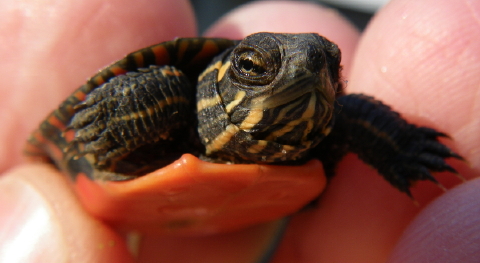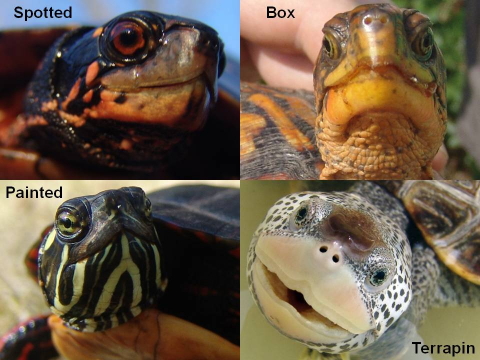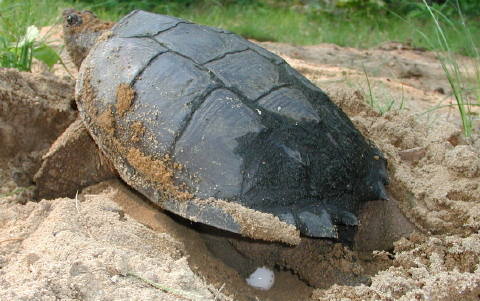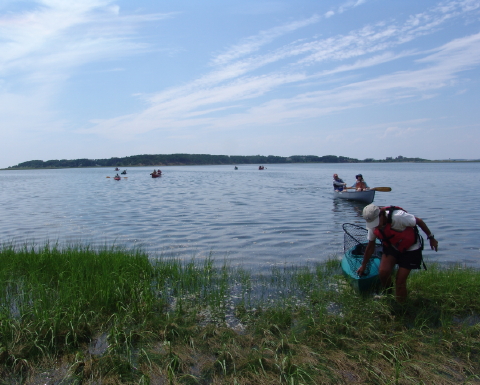Baby Painted Turtle
It’s that time again. In the next six weeks, local Cape Cod turtles will leave the quiet safety of woods, ponds and estuaries to trek into the noisy bustle of civilization to deposit eggs for the next generation of hard-shelled reptiles. They need our help to escape the hazards of modern life as intrepid turtles fearlessly venture across Route 6, Route 28, neighborhood streets and dirt roadways to reach nesting sites.
 Local turtles spent the long, cold winter burrowed deeply underground or buried under layers of ooze at the bottom of ponds, brooks and estuaries. They woke in April as temperatures rose, and after a quick warm-up basking in spring sunshine, they turned their thoughts to love and courtship. Now eggs are ready for in-ground incubation, and the time has come for females to trek to nesting sites to deposit the next generation of Cape Cod turtles. Such epic journeys entail considerable risk.
Four Species of Cape Cod Turtles
Why did the turtle cross the road?
Impelled by immutable laws of Nature stronger than their instinct for personal survival, turtles must reach viable nesting grounds across near impossible obstacles that sprawling civilization has lain before them. With Sisyphean persistence turtles tackle highway crossings, over and over again, until they successfully reach the other side or die in the process. For turtles there is no Plan B. Restrained by neither angst nor doubt, they soldier on as though one of Tennyson’s heroic six hundred.Â
Half an inch, half an inch,
Half an inch onward,
‘Cross the highway of death
Crawled bravely the turtles.
=====Â
Cars to the right of them,
Cars to the left of them,
Cars in front of them,
Crawled boldly the turtles.
=====Â
Theirs not to make reply,
Theirs not to reason why
Theirs but to cross or die,
Crawled nobly the turtles.
  =====
Nesting season has begun
The nesting season usually kicks off with painted turtles that wake early in protected ponds, followed by spotted turtles, snappers, box turtles and diamondback terrapins. No exception this year, the Turtle Journal team found a depredated painted turtle nest on May 17th, and Wellfleet Bay Wildlife Sanctuary sighted a painted turtle on a nesting run on Friday, May 20th. So far this season, we haven’t witnessed longer cross roadway treks, but it’s just a matter of days until warmer weather arrives as predicted for later this week.
Snapping Turtle Deposits Eggs in Outer Cape Nest
A while back, a very large expectant snapping turtle decided to cross Route 6 in Truro near Pamet Road from east to west. As she edged onto the highway on a gorgeous early June morning, traffic screeched to a halt. A responding police officer carefully tugged her back to the shoulder and down the east bank. (One must be extremely careful with a determined 60-pound snapper, if one wishes to disengage with the same number of fingertips one began the task.) Of course, 30 minutes later the traffic was jammed again when this relentless lady re-climbed the bank and began one more time to dodge cars. Luckily, the Truro dispatcher reached Turtle Journal’s hotline (508-274-5108) who managed to entice the snapper into a bucket and raced her across Route 6 to the west side. One more turtle saved with little inconvenience to tourists or snapper.
No one should risk life and limb, and children should only get involved with adult supervision, but a moment of human kindness can erase a ton of human negligence in the way we’ve scarred and fragmented the environment. It’s good for the turtles, good for humanity, and good for the soul.
2010 Turtles of Outer Cape Field School Discovers Loagy Bay
Learn more and save lives
If you’d like to learn more about Cape Cod turtles, Mass Audubon is offering a hands-on Turtles of Outer Cape field school from 22 thru 25 June at Wellfleet Bay Wildlife Sanctuary. The Turtle Journal Team, Don Lewis and Sue Wieber Nourse; renowned Cape Cod naturalist and turtle expert Bob Prescott; and author Dr. Barbara Brenessel will lead field adventures to discover the secrets of these hard-shelled reptiles and to save two rare and protected species of turtles on the Outer Cape: Northern Diamondback Terrapins and Eastern Box Turtles. For more information contact Mass Audubon’s Melissa Lowe at 508-349-2615.
While an optimistic attitude is always the best policy, we’re hopeful that for the next six weeks we can encourage you to look down rather than up. If you spot a turtle at risk, take a moment to help out. If the situation is too dicey, call the Turtle Journal hotline at 508-274-5108. If you see a turtle nesting and you’d like advice on how to protect those eggs from predators, call the hotline. To learn more about turtles and to follow the ongoing saga of nature on Cape Cod, visit Turtle Journal at www.turtlejournal.com.



